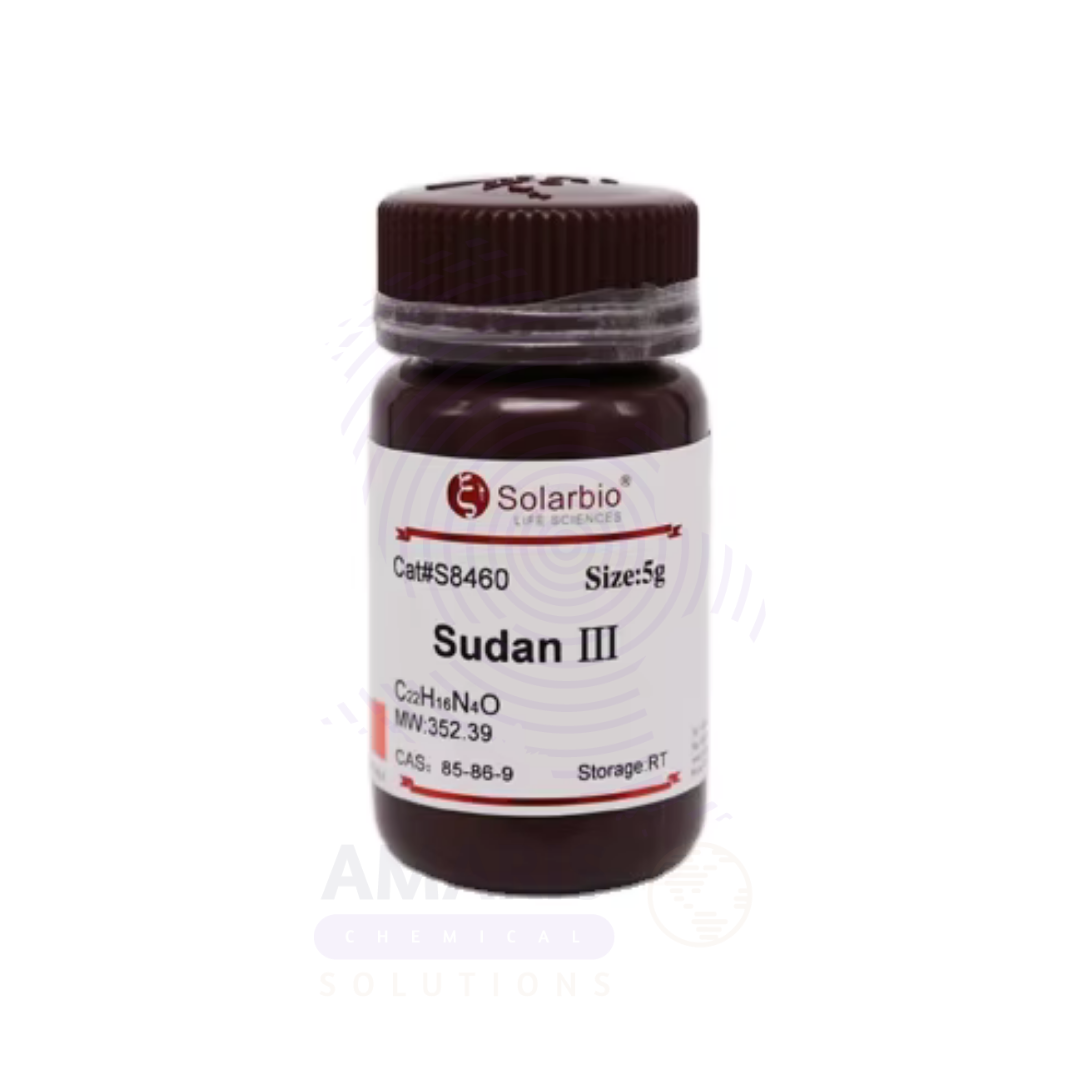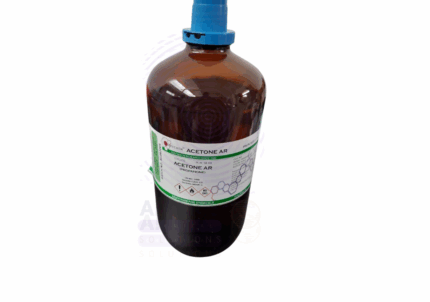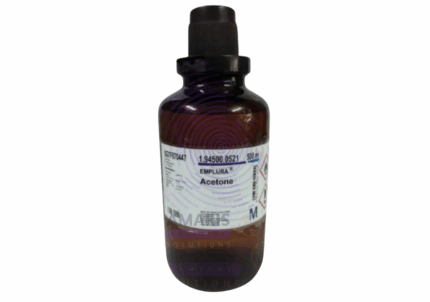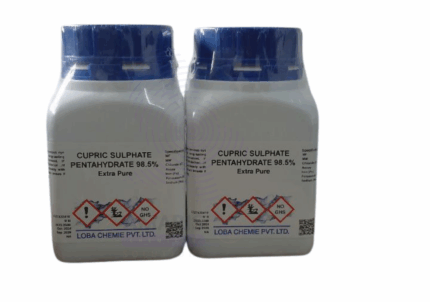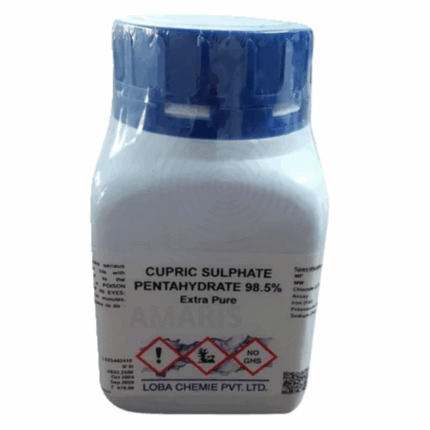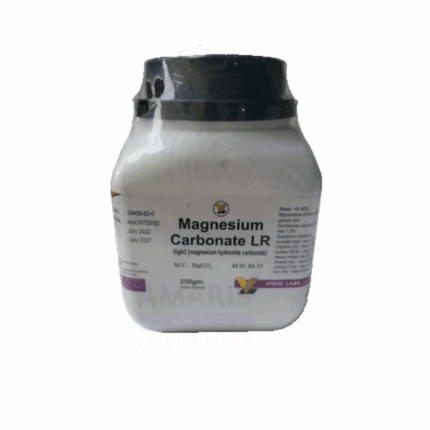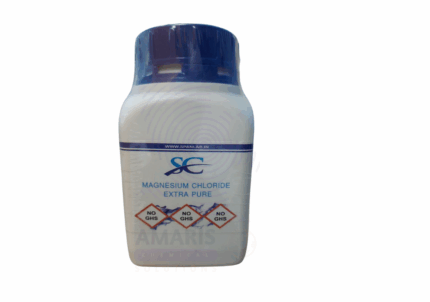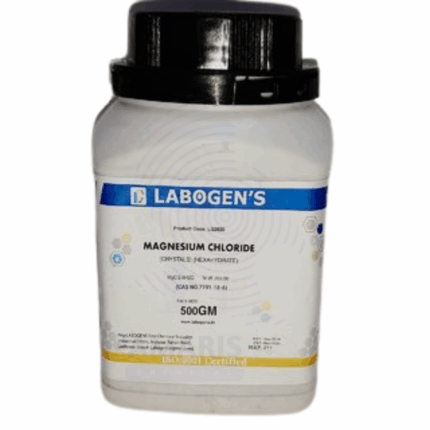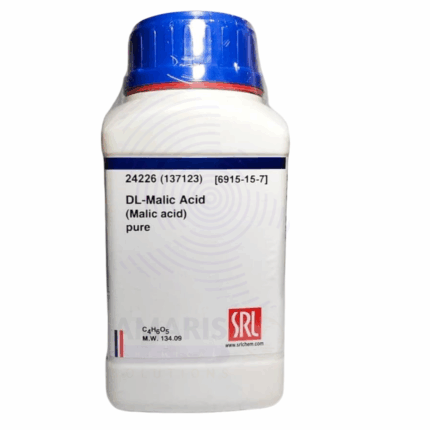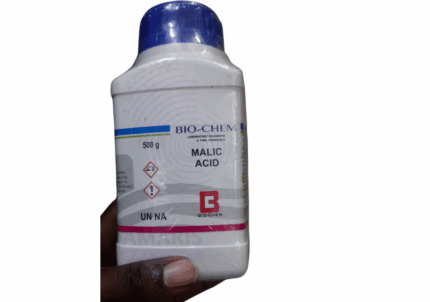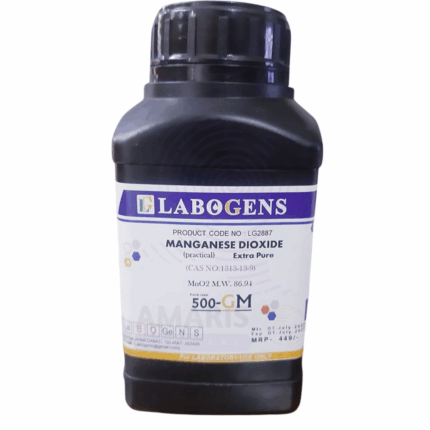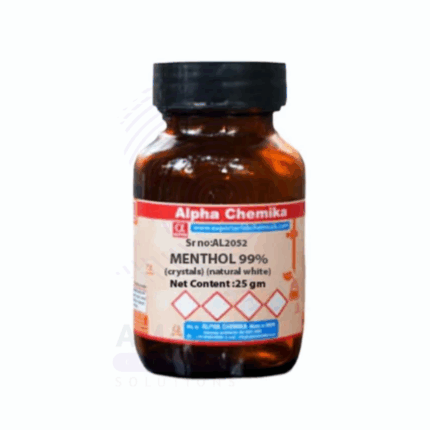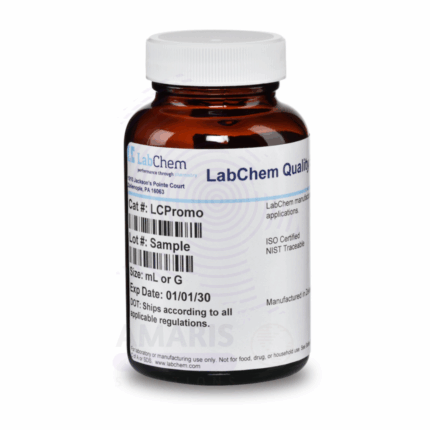
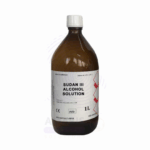
Sudan 3 Powder Red Extra Pure
$ 20.11 Original price was: $ 20.11.$ 19.98Current price is: $ 19.98.
Sudan 3 Powder Red Extra Pure is a synthetic azo dye appearing as a deep red powder, widely used in laboratory staining and dyeing applications. Known for its strong color intensity and lipid affinity, it is applied in microscopy and histological studies. While it has historical uses in food coloring, current regulations restrict such use due to toxicity concerns. Proper handling and storage are essential to maintain product integrity and ensure safety.
Sudan 3 Powder Red Extra Pure
PRIMARY USES
- Analytical Reagent & Laboratory Applications:
Used as a dye and staining agent in microscopy and histology for lipid and fat identification
• Utilized in qualitative analysis to detect the presence of oils and hydrocarbons
• Employed in research for staining biological samples and cells - Textile & Dyeing Industry:
Applied as a synthetic red dye for coloring textiles, plastics, and waxes
• Used for dyeing various materials including leather and paper - Food Industry (Restricted Use):
Historically used as a food coloring but now largely banned or restricted due to toxicity concerns - Cosmetic Industry:
Sometimes used in cosmetic formulations for coloring, though limited due to safety regulations
SECONDARY USES
- Plastics and Polymers:
Used as a coloring agent in plastic products - Printing Industry:
Employed in inks and printing dyes for bright red coloration
1. Basic Identification Attributes
- Chemical Name: Sudan III
• CAS Number: 85-86-9
• HS Code: 3204.12.00
• Molecular Formula: C₂₂H₁₆N₄O
• Synonyms:
- Solvent Red 23
- CI 26100
2. Physical & Chemical Properties
- Physical State: Red powder
• Color & Odor: Deep red, odorless or faint odor
• Melting Point: Approximately 205 °C
• Density: ~1.1 g/cm³
• Solubility: - Insoluble in water
- Soluble in organic solvents such as ethanol, chloroform, benzene
• pH Level: Neutral
• Vapor Pressure: Negligible
• Flash Point: Not applicable
3. Safety & Hazard Attributes
Hazard Class (GHS Classification):
- Possible carcinogen (category 2B)
- Skin irritant (category 2)
- Eye irritant (category 2A)
• NFPA Ratings: - Health: 2
- Flammability: 1
- Reactivity: 0
• Exposure Limits: - No established OSHA PEL or ACGIH TLV
• Reactivity: - Stable under normal conditions
4. Storage & Handling Attributes
Storage Conditions:
- Store in a cool, dry, well-ventilated area
- Protect from light and moisture
• Incompatible Materials: - Strong oxidizers
• Container Type: - Sealed plastic or glass containers
• Shelf Life: - Stable for several years if stored properly
• Special Handling Requirements: - Use gloves, protective clothing, and avoid dust inhalation
5. Regulatory & Compliance Attributes
Regulatory Status:
- Banned or restricted in food applications in many countries due to potential health risks
• Transportation Restrictions: - Not classified as hazardous for transport but handle with care
• Waste Disposal Method: - Dispose according to local hazardous waste regulations
6. Environmental & Health Impact
Ecotoxicity:
- Toxic to aquatic life with long-lasting effects
• Persistence in Environment: - Poorly biodegradable; persistent in water and soil
• Carcinogenicity/Mutagenicity: - Possible carcinogen, avoid prolonged exposure
• Biodegradability: - Low biodegradability
SAFETY PRECAUTIONS
Personal Protective Equipment (PPE):
• Wear chemical-resistant gloves and protective clothing
• Use safety goggles or face shield to prevent eye contact
• Use appropriate dust mask or respirator to avoid inhalation
Handling:
• Handle in a well-ventilated area
• Avoid dust generation and contact with skin or eyes
• Wash hands thoroughly after handling
Storage:
• Store in tightly closed containers away from heat and light
• Keep in a dry, cool, well-ventilated place
FIRST AID MEASURES
Inhalation:
• Move to fresh air immediately
• Seek medical attention if breathing difficulties occur
Skin Contact:
• Wash thoroughly with soap and water
• Remove contaminated clothing
• Seek medical advice if irritation develops
Eye Contact:
• Rinse immediately with plenty of water for at least 15 minutes
• Keep eyelids open during rinsing
• Seek medical attention promptly
Ingestion:
• Rinse mouth with water
• Do not induce vomiting unless directed by medical personnel
• Seek medical attention immediately
FIRE FIGHTING MEASURES
Flammability:
• Combustible solid
Extinguishing Media:
• Use dry chemical, foam, CO₂, or water spray
Hazardous Combustion Products:
• May produce nitrogen oxides, carbon monoxide, and carbon dioxide upon burning
Firefighter Protection:
• Wear self-contained breathing apparatus (SCBA) and full protective gear
• Avoid inhaling combustion products


 Preservatives(food)
Preservatives(food) Flavor Enhancers
Flavor Enhancers Acidulants
Acidulants Sweeteners
Sweeteners Antioxidants
Antioxidants Colorants(food)
Colorants(food) Nutraceutical Ingredients (food)
Nutraceutical Ingredients (food) Nutrient Supplements
Nutrient Supplements Emulsifiers
Emulsifiers
 Collectors
Collectors Dust Suppressants
Dust Suppressants Explosives and Blasting Agents
Explosives and Blasting Agents Flocculants and Coagulants
Flocculants and Coagulants Frothers
Frothers Leaching Agents
Leaching Agents pH Modifiers
pH Modifiers Precious Metal Extraction Agents
Precious Metal Extraction Agents
 Antioxidants(plastic)
Antioxidants(plastic) Colorants (Pigments, Dyes)
Colorants (Pigments, Dyes) Fillers and Reinforcements
Fillers and Reinforcements Flame Retardants
Flame Retardants Monomers
Monomers Plasticizers
Plasticizers Polymerization Initiators
Polymerization Initiators Stabilizers (UV, Heat)
Stabilizers (UV, Heat)
 Antifoaming Agents
Antifoaming Agents Chelating Agents
Chelating Agents Coagulants and Flocculants
Coagulants and Flocculants Corrosion Inhibitors
Corrosion Inhibitors Disinfectants and Biocides
Disinfectants and Biocides Oxidizing Agents
Oxidizing Agents pH Adjusters
pH Adjusters Scale Inhibitors( water)
Scale Inhibitors( water)
 Antioxidants(cosmetic)
Antioxidants(cosmetic) Emollients
Emollients Fragrances and Essential Oils
Fragrances and Essential Oils Humectants
Humectants Preservatives
Preservatives Surfactants(cosmetic)
Surfactants(cosmetic) Thickeners
Thickeners UV Filters
UV Filters
 Fertilizers
Fertilizers Soil Conditioners
Soil Conditioners Plant Growth Regulators
Plant Growth Regulators Animal Feed Additives
Animal Feed Additives Biostimulants
Biostimulants Pesticides (Herbicides, Insecticides, Fungicides)
Pesticides (Herbicides, Insecticides, Fungicides)
 Active Pharmaceutical Ingredients (APIs)
Active Pharmaceutical Ingredients (APIs) Excipients
Excipients Solvents(pharmaceutical)
Solvents(pharmaceutical) Antibiotics
Antibiotics Antiseptics and Disinfectants
Antiseptics and Disinfectants Vaccine Adjuvants
Vaccine Adjuvants Nutraceutical Ingredients (pharmaceutical)
Nutraceutical Ingredients (pharmaceutical) Analgesics & Antipyretics
Analgesics & Antipyretics
 Analytical Reagents
Analytical Reagents Solvents(lab)
Solvents(lab) Chromatography Chemicals
Chromatography Chemicals Spectroscopy Reagents
Spectroscopy Reagents microbiology-and-cell-culture-reagents
microbiology-and-cell-culture-reagents Molecular Biology Reagents
Molecular Biology Reagents Biochemical Reagents
Biochemical Reagents Inorganic and Organic Standards
Inorganic and Organic Standards Laboratory Safety Chemicals
Laboratory Safety Chemicals Specialty Laboratory Chemicals(Special Laboratory Equipment)
Specialty Laboratory Chemicals(Special Laboratory Equipment)
 Demulsifiers
Demulsifiers Hydraulic Fracturing Fluids
Hydraulic Fracturing Fluids Scale Inhibitors(oil)
Scale Inhibitors(oil) Surfactants(oil)
Surfactants(oil) Drilling Fluids
Drilling Fluids
 Dyes and Pigments
Dyes and Pigments Bleaching Agents
Bleaching Agents Softening Agents
Softening Agents Finishing Agents
Finishing Agents Antistatic Agents
Antistatic Agents
 Admixtures
Admixtures Waterproofing Agents
Waterproofing Agents Sealants and Adhesives
Sealants and Adhesives Curing Compounds
Curing Compounds Concrete Repair Chemicals
Concrete Repair Chemicals Anti-Corrosion Coatings
Anti-Corrosion Coatings
 Surfactants(cleaning)
Surfactants(cleaning) Builders
Builders Enzymes
Enzymes Solvents (Cleaning)
Solvents (Cleaning) Fragrances
Fragrances
 Electronic Chemicals
Electronic Chemicals Catalysts
Catalysts Lubricants
Lubricants Photographic Chemicals
Photographic Chemicals Refrigerants
Refrigerants Automotive chemicals
Automotive chemicals Pyrotechnic Chemicals
Pyrotechnic Chemicals
 Biodegradable Surfactants
Biodegradable Surfactants Bio-based Solvents
Bio-based Solvents Renewable Polymers
Renewable Polymers Carbon Capture Chemicals
Carbon Capture Chemicals Wastewater Treatment Chemicals
Wastewater Treatment Chemicals
 Pigments
Pigments Solvents(paint)
Solvents(paint) Specialty Coatings
Specialty Coatings Binders/Resins
Binders/Resins Additives
Additives Driers
Driers Anti-Corrosion Agents
Anti-Corrosion Agents Functional Coatings
Functional Coatings Application-Specific Coatings
Application-Specific Coatings
 Fresh Herbs
Fresh Herbs Ground Spices
Ground Spices Whole Spices
Whole Spices Spice Blends
Spice Blends Dried Herbs
Dried Herbs
 Leavening Agents
Leavening Agents Dough Conditioners
Dough Conditioners Flour Treatments
Flour Treatments Fat Replacers
Fat Replacers Decoratives
Decoratives Preservatives(baking)
Preservatives(baking)
 Plasticizers & Softeners
Plasticizers & Softeners Reinforcing Agents
Reinforcing Agents Adhesion Promoters
Adhesion Promoters Vulcanizing Agents
Vulcanizing Agents Antidegradants
Antidegradants Blowing Agents
Blowing Agents Fillers & Extenders
Fillers & Extenders Accelerators & Retarders
Accelerators & Retarders